
43 minute read
What confronts women in positions of political power, and what makes them successful? Women and Firepower The first battlefield defeat
GAYLE TZEMACH LEMMON TELLS
the extraordinary story of the Kurdish heroines who fought on the front lines alongside U.S. forces and helped defeat Islamic State in Syria. From the February 23, 2021, online Middle East Member-Led Forum program “Daughters of Kobani: Kurdish Women Warriors Against Islamic State.” GAYLE TZEMACH LEMMON, Journalist; Adjunct Senior Fellow, Council on Foreign Relations; Author, The Daughters of Kobani, Ashley’s War and The Dressmaker of Khair Khana EDDY SIMONIAN, Vice Chair, Middle East MemberLed Forum, The Commonwealth Club of California— Moderator
This is . . . the story of the women who handed the Islamic State its first defeat as part of a fighting force that stood up in the showdown of the town called Kobani on the border between Syria and Turkey. Really and truly the thing that struck me the most when setting out to write this story was that it started with a question I couldn’t answer, which for me is a hallmark of a great story.
How in the world did one of the most far-reaching experiments in women’s equality come to be on the ashes of the fight against the Islamic State, created by women who truly fought ISIS room by room, house by house, street by street, town by town as America’s ground force for a half decade? It’s a military story about the special operations community in the United States and its quest to work with local partners on the ground who were willing to take the fight to ISIS at a time when ISIS had had not one defeat.
It’s a story of women, which is deeply relevant to our times, as it’s about women who rewrote the rules governing their lives and who really reshaped the way an entire generation thought about what women’s work is. It’s a politics story about America and its hunt for a policy when it came to the tragedy known as the Syrian Civil War. As ISIS surfaces, how are the Americans going to counter the rising forms of the Islamic State at a time when U.S. forces absolutely could not politically be deployed on the ground?
Then it is also a story of media, because the truth is that the reason why we know about the fight for Kobani, and the valiant stand of this David-versus-Goliath force that truly had women’s rights and women’s equality right at the heart of it—this story also happened because it happened right on the border with Turkey,
DAUGHTERS OF KOBANI: TAKING ON ISIS
which meant that the world’s cameras could capture it in plain sight and catapult this story that was happening all around Syria. Then-Deputy National Security Advisor [now U.S. Secretary of State] Tony Blinken said there were Kobanis going on all across Syria and Iraq all the time, but this one was captured by cameras.
I wanted to understand how these factors come together to put this very far-reaching experiment in grassroots participatory democracy with women’s equality right at the center onto the global stage, because those very same women—with women’s emancipation right at the heart of who they were—came right up against the men of the Islamic State, for whom buying and selling women was a central part of who they were and what they did. It is Shakespearean in its reach and its breadth.
It is a little personal for me; my family is from the region. So when I first heard that there were women leading in battle against the Islamic State and leading not just women but men also, and who also had the deep respect of U.S. special operations forces—men [who] would spend their entire adult lives at war on behalf of the United States—I thought not only is this story incredible, but it’s incredible it’s happening there. I just could not imagine the journey they would have taken, to . . . say to their families, “I’m going to decide my future, but also I’m going to take up arms so that you can decide your future, so that you will not live under the yoke of the Islamic State.”
The women you’ll meet are some of the most extraordinary people I’ve had the privilege of meeting anywhere in the world. There’s Rojda, who ends up becoming the Americans’ interlocutor in the military campaign to route ISIS from its so-called capital of Raqqa. Rojda is someone who is very quiet, introverted, loves Brazilian soccer, loves Maradona, and loves books and ends up giving up her dreams of becoming a pharmacist to protect her neighborhoods when the Syrian Civil War starts.
As a girl, she dares to play soccer at her grandmother’s village; her uncle dresses up in a white sheet as a ghost to scare her and her cousins from doing something that is so shameful for their family as playing soccer out in the open in her grandmother’s village. We follow her all the way to standing with U.S. special operations in Raqqa in the command centers figuring out who goes
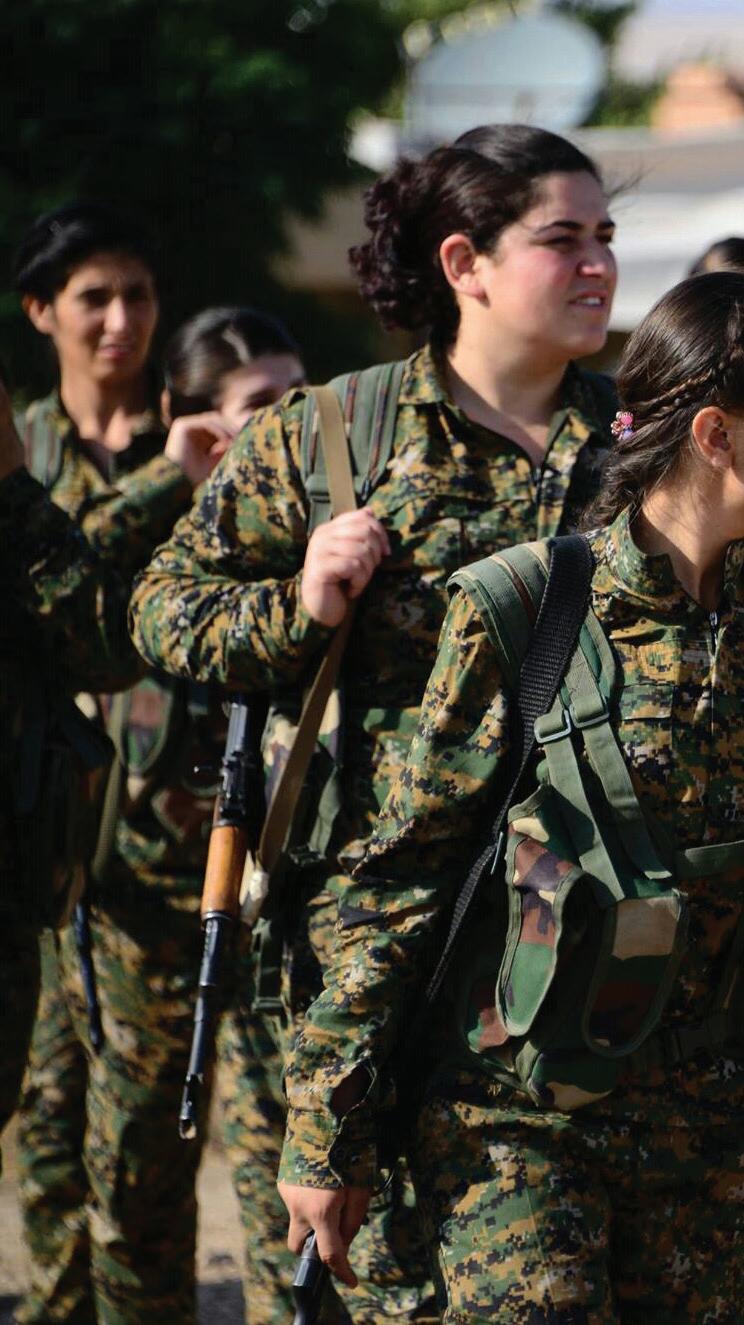
Photo by KurdishStruggle
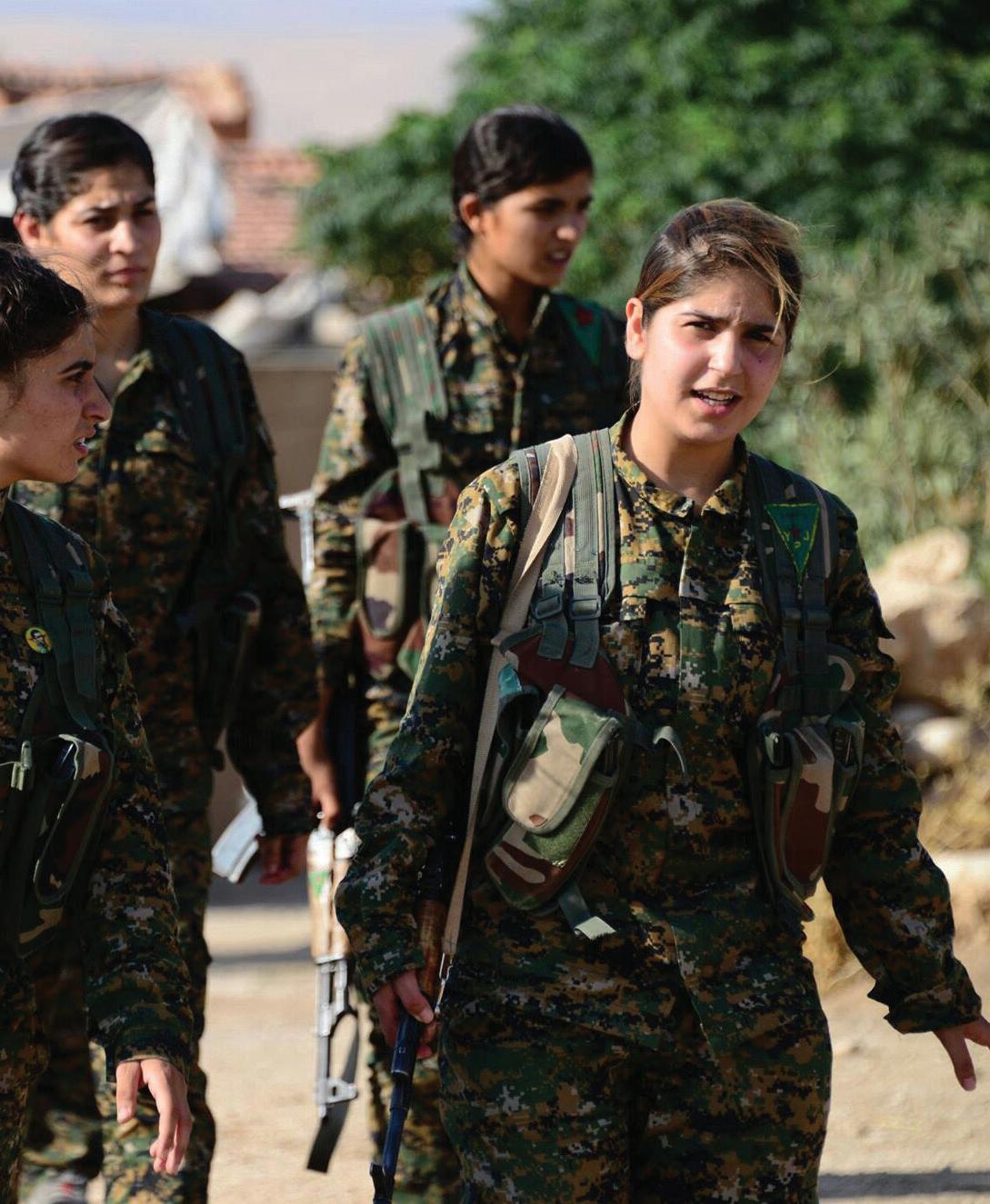
Photo by KurdishStruggle
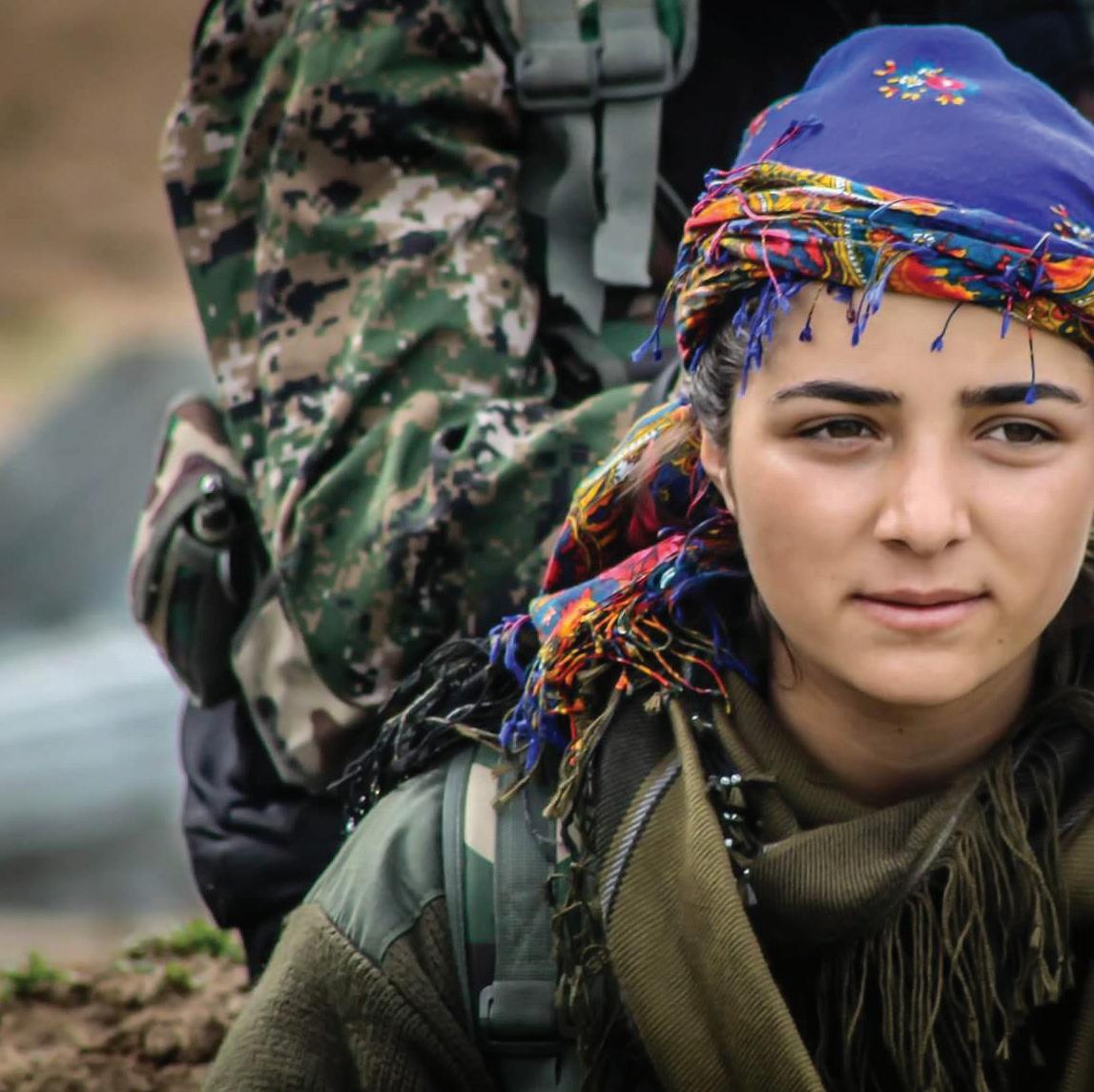
where and commanding thousands of forces in the effort to stop ISIS’ territorial caliphate.
Then there’s Znarin. She’s so serene in her demeanor. As a teenager, her parents said “You can’t go to university, because that’s not okay for girls.” “You cannot marry who you love, because your uncle already has chosen for you.” Then we follow her by the time she comes to this all-women’s fighting force. She starts out as a driver for Nowruz, who’s one of the other leaders we’ll meet, and ends up leading forces to retake her hometown from ISIS—and having girls come up to her and looking at her as a role model and her uncles calling her for advice. Then there’s Azeema, who is this swashbuckling character, very much larger than life, joke-cracking, chain-smoking, non-ISIS-fearing leader who always leads from the front. The thing that struck me about her is that ISIS [shot] her with a bullet, they shot her and yet still, even with an ISIS bullet near her heart, she goes to Kobani to the press conference at the end of the battle for Kobani and says, “I want the world to know that women were part of handing this first-ever defeat to the Islamic State.”
Finally, there’s Nowruz, who is somebody who has this demeanor that’s incredibly reassuring when you first meet her. It’s almost hard to remember, if you meet her out of battle, what she faced in war. She
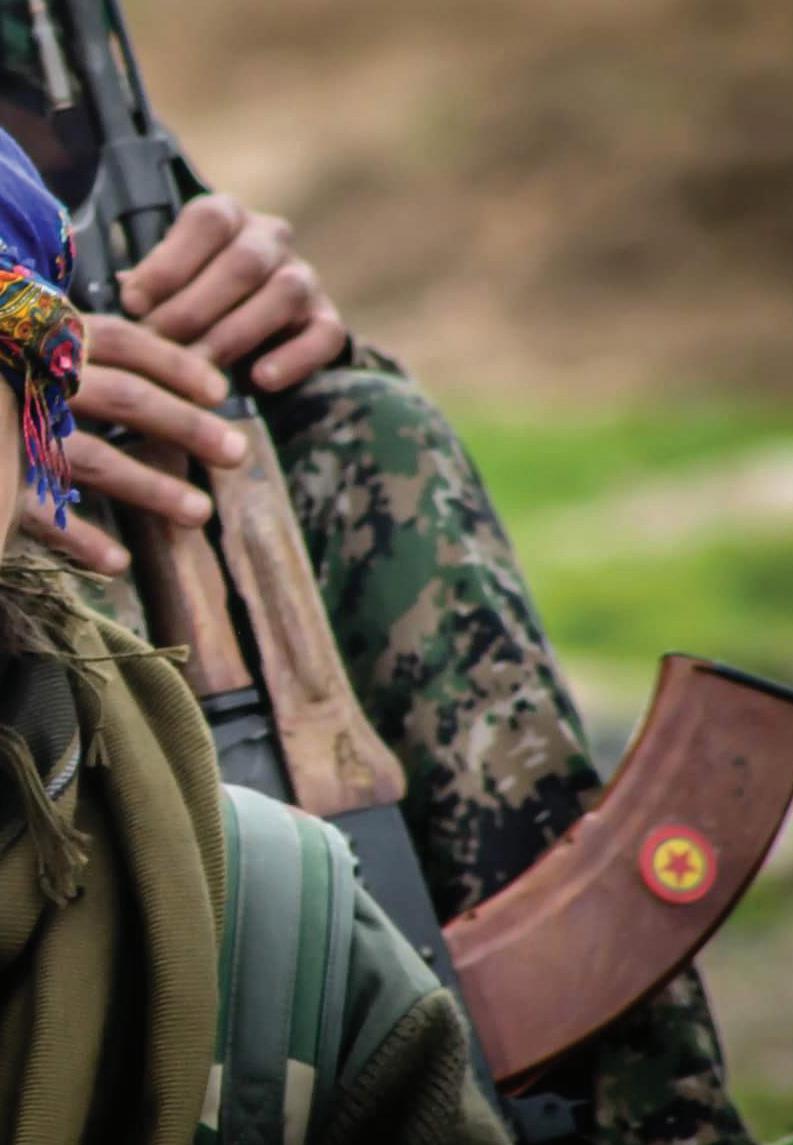
grew up with her mother, who never got to go to school, never got to be literate, who said, “Make sure her life isn’t like mine.” Here, we follow her all the way on her own journey to becoming a leader who, when her forces in Kobani are low on food, low on weapons, low on ammunition, they have almost no training compared to the men of ISIS who’ve come to take yet another victory, but they have will. She gets on the walkietalkie to the women who are her front-line commanders and says, “These men think you are worth nothing. Show them what you are made of, show them your value, and show them who you are and what women are capable of, so that even if this is our last breath your life will mean something.”
Those are the people that we get to spend time with along with the Americans who, from the military side and the policy side, are really desperate to make sure that ISIS is stopped. This is at a time when the fear for the U.S. homeland was extreme, and no one knew who was going to put their lives on the line on the ground doing the terribly difficult fighting that ISIS forced its enemies to make. This was a fighting force from the Islamic State that mined every room, that kidnapped civilians, that has shown it was capable of everything.
I want to take a step back to remember where we were at the time of this war. In 2011, the Syrian Civil War starts as a peaceful protest from young people, then morphs into a fight against extremism as groups from around the world come in and take advantage of the vacuum left by the Syrian Civil War and the atrocities of the Assad regime escalating day by day. Into this, the Syrian Kurds, who are this ethnic minority that siezes on the openings provided by the Syrian Civil War to govern itself, for the first time to be able to publish in its own language, name its children what it would wish, celebrate its holidays without the Assad regime interfering, speak in schools the language it wishes to teach its children in without fear of retaliation. All for the first time, this group of Kurds who follow Abdullah Öcalan—sitting in [a Turkish] prison, who raised a former communist to the left of Bernie Sanders in Vermont—they put together these ideas of governance, New England-style, town hall, participatory democracy, that will have women at its center and environmental awareness at its heart.
All of this unlikely story gets catapulted onto the world stage by the men of the Islamic State, who intersect with the Americans looking for a way to stop them, and it all comes to be in the town of Kobani in 2014 when ISIS is on a glittering string of victories and finally meets a Syrian Kurdish force that is not as proficient or as skilled or as armed as it is, but that has the heart to make a stand against it. That is when the Americans get involved. That’s really when our story starts.
Question and answer session with audience questions
EDDY SIMONIAN: Gayle, thank you so much. I was raised in the Middle East, but it’s one of those stories that I really needed to experience firsthand and I really need to read. As trivial as this sounds, but I truly felt attached to Rojda when she starts, because of soccer and because of Maradona,
the legend who passed away last year, but maybe it’s these small, trivial parts about someone’s life that truly connects people. I’m sure when someone is reading it, they’re going to find something within the lives of these women that they’re going to say, “Oh! I feel connected to this person.”
I do want to start off by discussing Öcalan. It’s very interesting how he was influenced by a philosopher from Vermont. Can we talk a bit more about his background, his life and what really transformed him? It’s a bigger story in the Middle East as well, where I think it really needs to be brought to light about forced marriages and how it’s a catalyst for a lot of women to want to just break free, and the simplest thing of deciding who to love is not even an option for a lot of these women. LEMMON: Yes. Abdullah Öcalan is a figure with the adjective “controversial” always attached to him. For NATO ally Turkey, he is considered Enemy Number One. He is sitting in a Turkish prison for co-founding the Kurdistan Workers’ Party, or PKK, which launched both a militant and then also later peaceful push for Kurdish self-rule. Once he is in prison, he starts reading the words of Murray Bookchin. Abdullah Öcalan—for people who have not been able to speak their language or celebrate their holidays—he recognizes citizens, [says people should] marry who they love, and the celebration that could be public in there with their music and their holidays, really moves people to follow his ideals and his ideas. This group of Syrian Kurds, who happen to follow Abdullah Öcalan, is really folks who are the most organized when the Syrian Civil War begins.
The ideas that he’s been putting out over his decades in prison deeply influenced him. Öcalan goes from thinking about a Kurdish nation-state to really thinking about Kurdish self-rule and [lessons from] this philosopher, Murray Bookchin, who is not very popularly known, but certainly deeply known within certain communities. [Bookchin] is a fascinating story of an immigrant from a Jewish family who grows up, really from [when he was] a child, taking care of his mother once his grandmother dies. He worked all kinds of jobs even as a boy to support his family. He goes to his own intellectual journey from communism to really being more of an anarchist, then going to the idea of social ecology. He moves from New York to Vermont. His former wife fights Bernie Sanders on a waterfront development project in Burlington.
Bookchin writes about . . . a world in which there is participatory democracy without hierarchy and with true care for the environment. He is talking about the environment decades before [others], really talking about the perils of technology decades before we were really contending with this, and talking about the importance of eco-consciousness where natural resources were shared among people very early.
His ideas, as Öcalan reads them in prison, intersects with Öcalan’s notion that the Kurds cannot be free until women are free. They get really put into place in a slice of northeastern Syria [with] these Kurdish forces and the armed wing in this called the People’s Protection Units and then later the Women’s Protection Units, which [included] the women that we will meet in this book. They are formed really with the ideas of Öcalan inspiring and giving them the spine of the ideology that they follow. SIMONIAN: I also want touch base that this is very personal for you. You did mention how your family’s from the region, but maybe, in as much detail as you want to go into, can we discuss how you had your own battles as well with gender roles within your family? LEMMON: My father used to joke that it was nature’s answer, it was the universe’s answer that he got me as the daughter. The dedication [of my book] says, “To Eli, who taught me about pistachios, Marlboro Reds, backgammon and the proper taste of watermelon,” because for those of you from the Middle Eastern families, my father was always complaining about American watermelon not having the sweetness that he grew up with even though he was a very, very proud Floridian to the end, very much loved South Florida and stayed there.
The introduction of the book is really about me trying to figure out [if I] could do justice to the story at a time when I had already written two books about the post-9/11 conflicts, and quite honestly was exhausted from trying to make Americans care about their wars. One of the things I thought was so fascinating was, how in the world did this experiment in women’s equality get created by women who fought men who bought and sold women in [this very]challenging region for women?
The Middle East is home to some of the strongest women I’ve ever met anywhere in the world. I think that is often too rarely understood, but the challenges they face—my grandmother was married as a girl. My father once, when I was giving a very hard time about the women in his family cooking more than the men— “Why couldn’t men do the cooking and cleaning?”—he looked at me and he said, “Do you really think men and women are equal?” He honestly didn’t mean it in a rude or insulting way at all. For him, it was as if I was telling him that reindeer dance on the moon at 9 p.m. every single night. It was just unfathomable from the world that he was raised in. Mother was from Baghdad, father was from Kirkuk and lost his country as a boy because his family was the wrong faith.
I never even really talked about my father
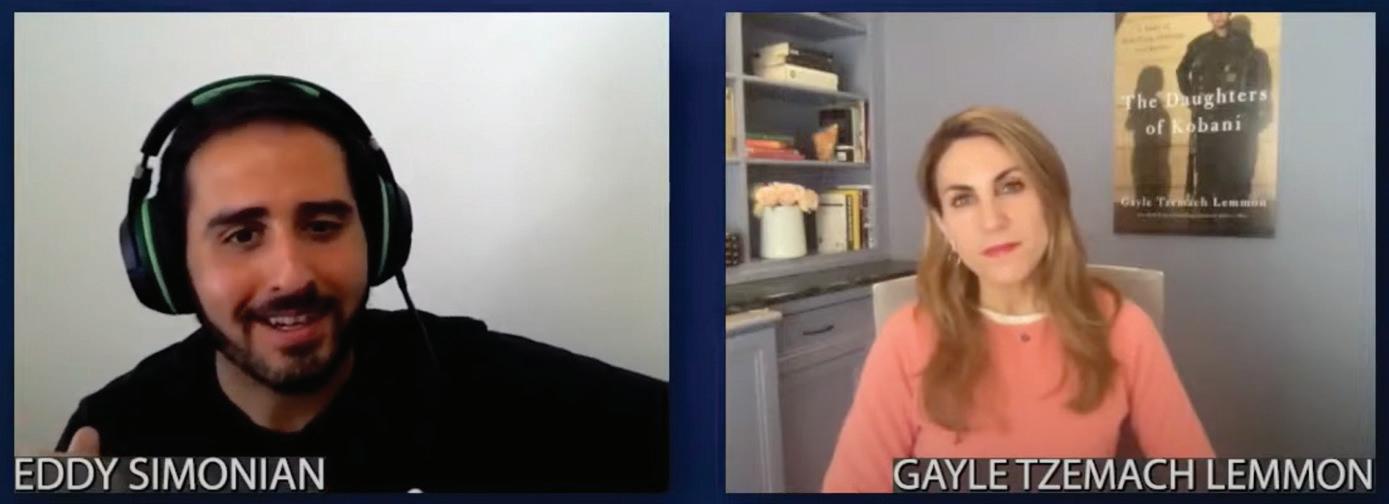
in a book, but I did because I had just a fraction of an inkling of what these women would have faced. I think it absolutely made me even more curious to understand who they were and how in the world truly had this come to be. SIMONIAN: You were on the ground over there with these women. You went there against the advice of many people. Could you discuss some moments that happened there that, even with war, even with the bloodshed, shows you the humanity of the people on the ground, and how these women were able to lead forces that were mainly comprised of men as well? LEMMON: Just to back up a little bit— in 2013, the women had been part of organizing in their communities to stand up—at the beginning just to protect their neighborhoods. There was no Islamic State in 2011, 2012, but the footprints of it are beginning to form. By 2013, there are Al Qaeda-linked groups who are the predecessor to the Islamic State, and then comes ISIS officially declared in 2013. The women’s protection units are born in April 2013. I asked Rojda once, “Why in the world did you start the women’s protection units, because you already had equality according to your ideology? Öcalan [said] Kurds cannot be free until women are free, and you already were fighting alongside men in battle.”
She looked at me and said two things. One is, “We couldn’t let stand a world in which the ideology that said women could be property would stand. Secondly, we just didn’t want men taking credit for our work.” There is not one woman who is listening, not one woman born, who does not know that feeling from an instinctual, gut level. Even in the most extreme form of fighting ISIS, it’s still the same sentiment. For me, anything I ever faced on the ground is a shadow of what the people I have the privilege of meeting and whose stories I have the privilege of telling faced.
I think it’s hard to imagine, but the reality is that these women are part of a governance structure that has actually built a truly real and very fragile stability on the ashes of the ISIS fight. What’s fascinating, and the book really talks about this, is that women are everywhere. In every town, there’s a cohead of a male and a female, so a man and a woman who run the civil council together. There are women’s councils in every town. There are women judges who helped handle cases that are sensitive, involving women. In the founding document that is recognized by nobody outside of their [local] terrain but is governing there, women are mentioned 13 times. Women have equal rights, women have rights to economic means, no child marriage, yes to girls education, no to dowry, all of these things that would be far-reaching anywhere in the world. Women have a right to be represented in the political bodies.
They put women right at the center of all of this. For me, what was fascinating was to see women when you go get a security pass signed, or all the very mundane things you do when you report from a place like northeastern Syria. Get your letters signed; watch cable TV with the official who is signing it for you. There are women everywhere, which you just don’t see [elsewhere], and that struck me immediately.
The other thing I would say is I give them huge credit for the fact that your biggest opponent when you’re on the ground—of course, there is instability and fragility, but it’s almost complacency, because the one so important for U.S. folks to know is that you never see the Americans. The Americans are like the Oz-like presence they know exists somewhere, but you don’t see them except for occasionally on convoys on the road. While, for me, it’s a lot of sitting on your backside, traveling from northern Iraq to the border, another four hours across the border into your town, then another 4–7 hours to go from city to city or town to town in northeastern Syria. I’ve had such a privilege of working with an amazing team, and really spending time with people who’ve seen so very much and were willing to share that with me. SIMONIAN: I want to touch on what you mentioned about embedding women’s rights within the law of the land, you could say. Can we talk a bit more about some of the struggles that they face in the sense of outlawing polygamy, maybe going a bit deeper into that?
What I want to touch on as well is it’s easy to write laws, it’s tougher to enforce them, and it’s tougher to change the cultural mindset. Could you maybe discuss a bit of how things have changed in the villages, how things have changed on the ground? I understand that a lot of these fighters have some changes within their families, but has this affected other women? Has this affected women that weren’t in battle, women that weren’t part of these forces? LEMMON: Yes. You gave me a lot to answer.
By 2018, 2019, I was in the office of Faisal Yousef, one of the politicians. I said, “Wow, this is really hard what you’re trying to do.” She looked at me, she said, “Yes, we’re building a lake in the desert. It doesn’t happen overnight, and we will not change 5,000 years in seven, but what we can do is start.” They looked to the example of Tunisia, to say that women who were part of a revolution must stand up then for their rights.
I said, “Did men tell you this is too much too soon? You know, all the things we hear in the U.S. Too much too soon. Too fast, we’re not ready.”
“Of course they do,” she looked at me like, Come on, what a dumb question? “Of course they said that to us, but we didn’t care. If we don’t do it now, when will we do it?”
The fact [is] that women were fighting ISIS truly room by room. There’s a scene in the book where Rojda goes and puts her gun through wall and brushes up against the leg of an ISIS fighter. ISIS for them is not an abstraction. ISIS is the guy in the next room trying to kill them. Those military gains were only important to those women because of the political gains. As Nowruz once said to me, “We knew that if we show we could lead in battle, we could govern in peace.” That is what they were after.
When Faisal Yousef said, “Of course men don’t like it, so what?” I thought that is a fascinating thing, because maybe half a year later, nine months later, we were in Al-Hasakah in northeastern Syria and our car broke down. A group of women forces came and drove us back in their pickup trucks. Three young women across the front and from the back of the [rearview] mirror, where we sometimes see air fresheners in the U.S., they had a picture of another young woman who had been killed fighting Isis.
They were remembering their friends, driving with their friend’s memory, and they go through a Syrian regime checkpoint, because the regime is an uneasy coexistence with certain towns. They go through the regime checkpoint, nothing happens. They go through one of their checkpoints and they’re all high-fiving all the other young women and they’re all hugging. I’m the only one thinking, “This is like science fiction.
When do we see this?” What struck me that night as I was trying to figure out what was different was that we have never seen women anywhere more comfortable with power and less apologetic about owning it. That stayed with me, and I really want readers to experience what that looks like and feels like. SIMONIAN: One of my favorite poets is Nizar Qabbani, who was a Syrian poet, and was also on the forefront of women’s rights, and it happened because his sister committed suicide after she was forced to marry someone she didn’t love. Again, this is a theme [about] forced marriages. Unfortunately, it is still prevailing within the region. It just exists. It gives me so much hope to read the story about these women and how they’re fighting this themselves.
In many cases they are doing this themselves, because what a lot of viewers are wondering and what we’re seeing is, did we—the United States government—just turn our backs on these women and walk away and leave them in between a rock and a hard place? We’re seeing a multi-fronted attack on them, and maybe we could discuss this a bit more. LEMMON: I regularly say this, that there is much more hope in northeastern Syria than in northwest Washington. Even with all the setbacks, even with everything that happened with the Turkish-backed incursion in October 2019, what struck me when I was in northeastern Syria in December 2019 was how durable and enduring what they have built truly is. I went into northeastern Syria really expecting the worst, and my teammate— who you’ll see in a photo in the book, Mustafa—I keep saying, “What about this checkpoint? What about that checkpoint? What about this city? What about that city?” He was like, “Same deal. Same. It all looks the same.” I said, “Really?” He said, “Yeah.” I was like, “Great.”
No, I don’t want to minimize at all the displacement and the loss of life from that. In fact, I spent time with young women from the Arab community who were in a camp for the displaced, who were from Tabiat in northeastern Syria. I interviewed this 14-year-old girl who said, “I don’t know when I’m going back to class. I lost my home, I lost my friends, I lost my family.” I don’t want to minimize that at all.
But what strikes you is that what they have built, even in Raqqa, which is nominally controlled now by the Russians and the Syrian regime, there is still the same civil councils, still the same women’s councils, which we’ll see at the opening of the Raqqa Women’s Council in the book. All of this has lasted.
At the same time, there’s a moment where we see Rojda and she has been part of leading the campaign with U.S. special operations to retake Raqqa from ISIS, a brutal fight. She has dedicated every day of her life for four years to fighting ISIS not just for the region, but certainly for the United States, Europe and the rest of the world. We spent this evening with her; she is with this Yazidi woman who was enslaved by ISIS and shares her story and helps share what she learned for those who were fighting ISIS, so that they would understand who was where and what she knew. We watched her go back to the same town where she was part of helping this woman, who had been brutalized by ISIS, get her way back to her family in northern Iraq.
Now, she has to go back to the same town to fight against forces backed by a NATO ally. Now, she’s alone. I want readers to experience that moment, but I also want readers to understand this is about America’s national security. President Biden this past few days said we were going to keep the pressure on ISIS. This is the force that took 10,000 losses in the fight against the Islamic State for the war, and women played a central part of that, and these women played a central part of that, and I hope you will be inspired by spending time with them in hearing their stories. SIMONIAN: I think to myself as well, the courage of these women had—I don’t know if I could do what they had done. LEMMON: It’s really scary. I will say, having been on the Raqqa frontlines, there’s a moment in the opening of the book in the prologue [with] Klara, one of the commanders who takes us to the frontline. I genuinely was nervous. We’re in Kevlar [protective covering], my whole team were in Kevlar, and Klara has a green paisley, green flowered Kurdish scarf. She’s walking around like she is just at the office for another day pointing at this car bomb that’s still smoking. “Can you believe they’re targeting us? Can you believe they do this every day?” My crew and I were like, “It’s still smoking. Wow!”
You realize that for them, this has become their daily job. That drive to the frontline has become their commute to work. It’s so important for readers to know they are not superhuman. They’re not any different from you and me, but they were called upon by the world to answer a threat that came to their doorstep, and for them, it was very important, it was clear that women were saying no more. SIMONIAN: You [referred to] the dangers of being desensitized to this violence. Are these women or communities over there, are there any programs they’re doing or implementing right now to actually help people heal? It’s not easy, and we understand how in the United States, when our soldiers came back, [they deal with] PTSD, etc. Especially right now, what’s happening in Syria? Is there anything on the ground that these committees are actually working on to help these people return and maybe come back to normal life eventually when [the civil war] subsides? LEMMON: I’ve spent a lot of time in the military community, and also for this new second book I did, Ashley’s War, which is how this whole story started. It was a soldier from Ashley’s War who was working in Syria; he’s deployed to Syria. I will tell you the big difference is that in northeastern Syria, you cannot escape the war. There is a deep sense of community for those who are fighting. It is not some faraway war where the reality is that less than 1 percent of the United States has 100 percent of its wars for two decades with very few people really having their lives affected.
It’s very different in northeast Syria, and you drive down the road and from the lamp posts are smiling photos of young women and young men who were lost in battle defending the town. You never escape how much sacrifice was made for those towns.
I think that community spirit is what is deeply different, because in the U.S. spend time with folks who served this country and who sacrificed for this country, and often you see many people say, “Oh, thank you for your service,” and then they don’t want to ask anything else. They don’t really want to know anything else, and they certainly don’t want to engage with the wars that the U.S. is undertaking.
I think that a very large difference is that spirit of solidarity on people being in it together.
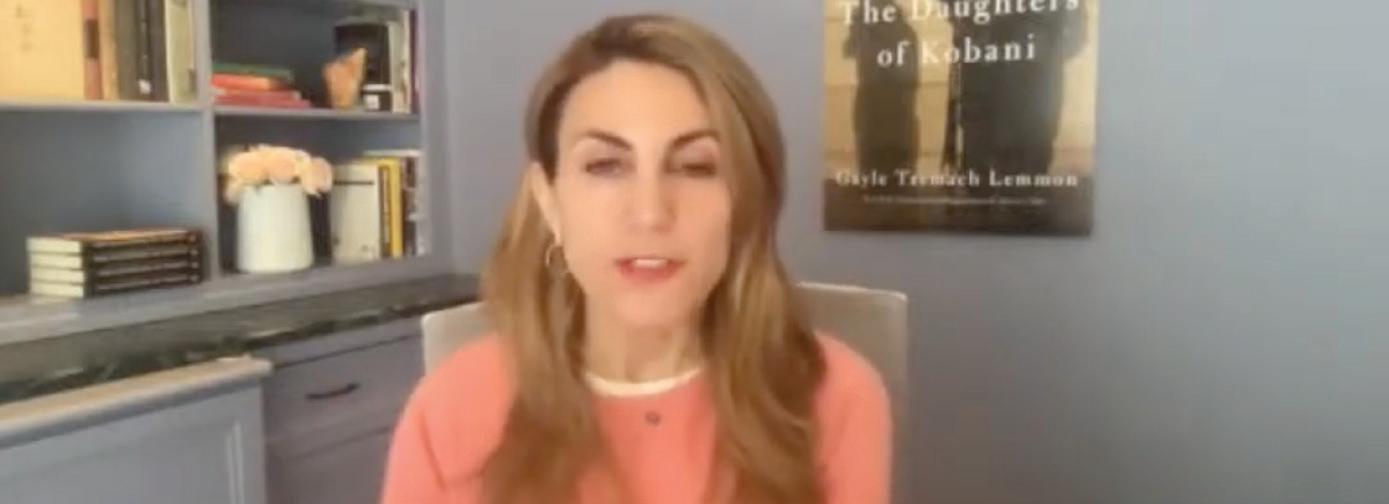
SIMONIAN: Within the region, there’s many different sects, many different religions within that. We hear a lot about the Kurdish fighters. Have these women influenced other religions to form their own groups and form their all-women groups to fight ISIS, to implement new norms within their own cultures as well? LEMMON: Two things on that. There are women from across communities who are very much a part of the story, and that was very important both for me and for them. It’s crucial because I [interviewed] this young woman who has just spent the whole day fighting the Islamic State. It was hot. There are really like 15 young women with smiley face socks, fatigues, braids, some with Timex watches on their wrists and all of them with their AK-47 standing at attention against the wall for them to be ready at a moment’s notice.
I looked to her and she said, “We’re writing our own history now. We’re doing this not just for ourselves but for women across the region and across communities.” I said, “Well, in the Middle East? Isn’t it a very hard place to start?” She looked like, Oh my gosh, you are a really dumb American. What a question that you just asked me! “Of course.” She looked at me like, “What kind of question is that? Because of course it’s hard. We’re from here. We know how hard it is, but it wouldn’t be worth anything if it weren’t hard.”
I will tell you about a young woman from the Christian community that stayed with me and I thought about so often. I spent the day with her. ISIS had kidnapped Christians in Khabur Valley, more than 200 people. You can’t quite imagine how terrifying [it is] for the men of the Islamic State to come in your house at night, round you up at gunpoint. You still have your cellphones; and just the terror that that inspires because of your faith. ISIS had come to the Christian community, this young woman had seen that, had watched this clip, and she said, “No, I’m going to be part of this Women’s Protection Force from the Christian community that’s going to defend our neighborhoods.”
Her parents say “No way. You’re smart, you have a promising future, no way. Go to school.” She said, “No, I really think this is important.” Then her parents go to church and people come up to them at church and say, “We’re so proud of your daughter and what she’s doing for our community.”
That starts to spread. Geena Davis and many others have talked frequently about the notion of “If you can see, you can be it.” The importance of seeing people who look like you. And that’s what happens. Other young women see them come back to their neighborhoods, come back to their communities, and this is across neighborhoods.
One of the most powerful days of interviewing [involved] the young women from the Arab communities in Raqqa who lived under ISIS and who later joined the Women’s Protection Forces. I sat with Rojda one day on the river, and spent the day just asking them what that was like. I could have been there for days. Every one of these young women had a story. One of them had read Egyptian poets only for three years, hadn’t left the house, but really spoke in paragraphs because that was her education. Another told me of being arrested by ISIS, because her wrist had [been visible] when she crossed the street. ISIS arrested her and her father and said the only way she could be free is if she married one of the [ISIS fighters].
Then there was a woman who is in the book, who is somebody I think about nearly daily for her grace and her courage and her example. I was asking women what their stories were, and it turns out this was a woman whose brother joined ISIS and forced her to marry an ISIS fighter. She tries to divorce him, she tries to leave him, her brother keeps sending her back to this man. She ends up escaping, finally, is brutalized by ISIS in the town of Idlib, and then she comes back. She has the U.S.-backed forces of whom the women in this story are a part say, “We’ll take you home. Where do you want to go?” She said, “No, I want to join the Women’s Protection [Force].”
I couldn’t imagine the courage it took for her to do it, and so I asked her, “Why in the world? How do you have this courage to do this? Because I feel like I wouldn’t even move from that if I had endured all that you survived.”
She said, “Why should we let this go unanswered? This is my way of saying this should not happen.”
It was hearing this young woman say that that makes you realize this is not about communities and, in fact, the Americans used to say to me, “Oh, ask people outside Kurdish communities if this matters.” It’s not that everybody is singing “Kumbaya” and holding hands, it’s that women have an inherent sense of dignity wherever you are in the world regardless of community.
I would ask Arab women in Raqqa, “Is this a Kurdish project?” Or, “Is this an American experiment?” They would be so insulted by the question. “Who told you? I’ve always been strong. I’ve always spoken up in my family, and my mother-in-law is the reason why I’m here today at the opening for the Raqqa Women’s Council.”
I think it’s so overstated that this is one community where women want to have their own voice and exercise her own agency. It is the universal quest for human dignity.
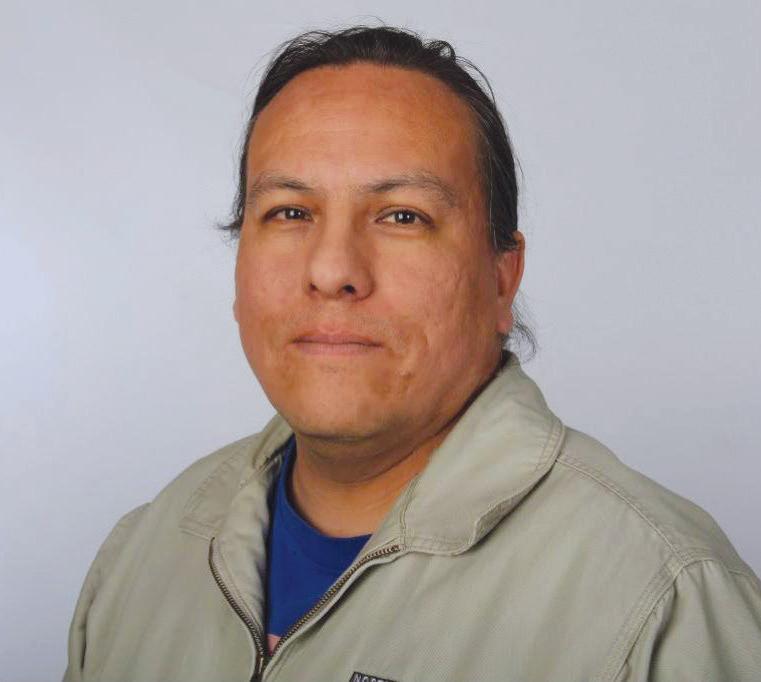
Dakota is an enrolled member of the Standing Rock Sioux Tribe and a Native American Studies instructor at the United Tribes Technical College, a Native American owned and operated college. He has his M.A in History from North Dakota State University and B.A. in Theology from the University of Mary. Dakota runs The First Scout blog which focuses on Lakota issues and traditional moon counts. Previously Dakota was an interpreter at the State Heritage Center and Museum in Bismarck. He is both Yanktonai and Húŋkphapȟa Lakȟóta, and was raised in Fort Yates on the Standing Rock Sioux Indian Reservation.
What to Expect
Please note that our itinerary involves some time driving from city to city, as well as, a fair amount of walking around the sites including some stairs and uneven terrain. Most days have an early-morning start and include a full day’s schedule of activities. Participants must be in good health and able to keep up with an active group. Drive times average is between 3-4 hours per day, sometimes over winding roads. The longest day of driving is 7 hours total with stops for touring along the way. Temperatures in the region average in the 55-65’s (°F) during the day, and 35-45’s (°F) in the evenings. This program will be covering topics that include violence, and that may be difficult for children. Therefore, we do not recommend this program for people under 16.
Independent arrivals into Bismarck. and to the Radisson Hotel Bismarck. Meet at 3:00 with our group to depart for an afternoon visit to the North Dakota Heritage Center and State Museum. Our discussion leader Dakota Wind Goodhouse will guides us through the museum. End the afternoon meeting with Danielle Ta’Sheena Finn, a citizen of the Standing Rock Sioux Tribe and an acclaimed activist and artist. Enjoy a welcome reception and dinner with fellow travelers.
Radisson Hotel D
Today begins with a visit to Fort Abraham Lincoln State Park. The reconstructed ‘On-ASlant Indian Village’ provides an excellent introduction to the earth-lodges of the Mandan Indians who occupied this site. Continue driving along Highway 1806, the Standing Rock National Native American Scenic Byway, an 86-mile route that climbs up and down the Missouri River, past buffalo herds and eagle’s nests. History comes alive on this journey where the great Lakota spiritual leader Sitting Bull lived and died.
Enter the Standing Rock Reservation, home to the Lakota and Dakota people. Meet with Rev. John Floberg, who is deeply committed to the Dakota Access Pipeline (DAPL) protests. With the endorsement of the national Episcopal Church, Floberg provided supplies to campers and hosted protestors in his church. Continue on to nearby Fort Yates, the main town of Standing Rock and enjoy a locally cooked lunch at the Community Center. After lunch, visit the original burial site of Sitting Bull who was assassinated on the western part of the reservation.
BISMARCK, NORTH DAKOTA
Monday, September 27
Depart the hotel and drive to Knife River Indian Villages National Historic Site, a National Parks Service site, which preserves the historic and archaeological remnants of bands of Hidatsa, Northern Plains Indians. This area was once a major trading and agricultural area. Continue on to the Double Ditch Indian Village, a large earth-lodge community inhabited by the Mandan Indians for nearly 300 years, and once a center of trade between the Mandans, their nomadic neighbors, and later, Euro-American traders.
End the afternoon meeting with Emma Doll, a Native American who set up the Five Nations Arts Organization, a resource to artists and collectors of Native American art in the region. Also meeting the group will be Cheryl Kary, co-founder of the Sacred Pipe Resource Center (SPRC) which was founded by a group of residents of the Bismarck-Mandan area who are committed to the mission of maintaining a home-away-from-home for off-reservation Native Americans living in the area.
Radisson Hotel B,L,D
End the afternoon visiting the Standing Rock Tribal Council Offices which were designed following authentic Native American architectural elements. Drive about three hours to our Keystone hotel, tucked deep in the Black Hills. Dinner at our hotel.
K Bar S Lodge B,L,D
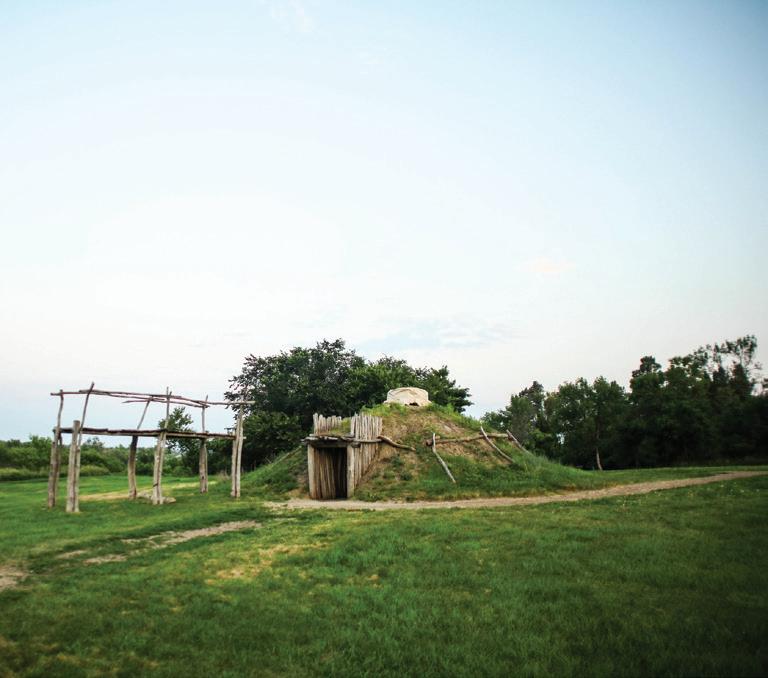
KEYSTONE, SOUTH DAKOTA
Wednesday, September 29
This morning meet with Sequoia Crosswhite, a member of the Cheyenne River Sioux Tribe. He is an accomplished musician, grass dancer and historian, as well as an enrolled member of the Cheyenne River Sioux tribe and a descendant of Chief War Eagle and Chief Swift Cloud.
Drive just over an hour to the inspiring Thunder Valley Community Center. A Lakota run grass roots center with goals to “create models of change that will overpower intergenerational poverty and build momentum towards regional equity.”
Head towards the town of Pine Ridge stop-
ping at the site of the Massacre of Wounded Knee in 1890. The “battle” was actually a massacre where hundreds of unarmed Lakota women, children, and men, were shot and killed by U.S. troops.
Stop in at the Oglala Tribe Justice Center which houses courtrooms, a short term correctional holding facility, offices for law enforcement and justice officials. Funded by the Bureau of Indian Affairs, the facility is the first of its kind to blend traditional tribal justice concepts with a technologically advanced design.
End the afternoon meeting with artist Joe Pulliam Buffalo Dreamer whose work is in the permanent collection of the National Museum of the American Indian. Pulliam has dedicated his art to preserving Lakota culture.
K Bar S Lodge B,L
DENVER, COLORADO
Thursday, September 30
Accompanied by Sequoia Crosswhite spend the morning visiting the Badlands National Park and stopping at the Wind Cave National Park, an important spot in the Emergence Story.
Continue to Denver making a stop in Boulder to meet with the Native American Rights Fund (NARF). NARF has provided legal assistance to Indian tribes, organizations, and individuals who might otherwise have gone without adequate representation involving tribal sovereignty, treaty rights and natural resource protection. Continue to Denver and checkin to our hotel. Enjoy dinner on your own.
Downtown Renaissance Hotel B,L
DEL NORTE, COLORADO
Friday, October 1
Depart the hotel and meet with Darius Smith director of the Denver Anti-Discrimination Office where he investigates, conducts administrative hearings and mediates civil rights discrimination complaints. Darius also serves as the American Indian Liaison to the Denver American Indian Commission that advocates for social and cultural awareness to promote economic and political equality.
After lunch, drive through spectacular landscapes stopping at the Great Sand Dunes National Park, home to the highest sand dunes in North America. The mountains, forests, and dunes in the park are sacred to the Apache, Navajo, Ute, and Pueblo Indians. Drive on to Del Norte and the Windsor Hotel, one of Colorado’s oldest hotels.
Windsor Hotel B,L,D
IGNACIO, COLORADO
Saturday, October 2
This morning drive about two hours to Chimney Rock, an intimate, off-the-beaten path archaeological site located at the southern edge of the San Juan Mountains. The site was home to the ancestors of the modern Pueblo Indians. Enjoy lunch nearby before driving to Durango and the Native American Center (NAC). The center provides academic, cultural, social, and transitional support for undergraduate Native American students.
Continue on to Ignacio and the Sky Ute Casino Resort, located on the Southern Ute Reservation. The oldest continuous residents of Colorado are the Ute Indians. End the afternoon with a discussion focusing on the social and economic impact of Indian gaming. Gaming has had a significant positive economic impact on the Native American community, yet is not without its detractors. We’ll hear from tribal experts on the economic and political realities.
Sky Ute Casino Resort B,L
IGNACIO, COLORADO
Sunday, October 3
This morning visit the Southern Ute Cultural Center and meet with Linda Baker, director of the Southern Ute Cultural Center. Owned and operated by the Southern Ute Indian Tribe to preserve and promote Ute culture. Here we will also meet with Edward Box III, Culture Director of the Preservation Department.
Meet with the staff at the Southern Ute Drum, the tribe’s biweekly community newspaper. Enjoy a farewell dinner this evening.
Sky Ute Casino Resort B,L,D
DEPART
Monday, October 4
Independently transfer to the Durango–La Plata County Airport for flights home.
B
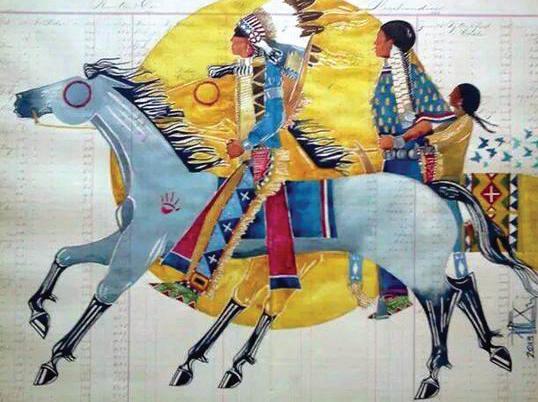
Price Per Person: $4,895 Single Supplement: $880
Based on minimum of 15 travelers Maximum 24 travelers, not including staff.
Tour Price includes:
• Accommodations and meals as per itinerary • All sightseeing in an air-conditioned coach • Bottled water on the bus • All entrances and events as listed • Discussion Leader to accompany the group • Pre-departure materials and reading list • The services of a professional tour manager to accompany the group • Gratuities
Does not include:
• Airfare to Bismarck and back from
Ignacio/Durango • Alcoholic beverages except for wine and beer at welcome and farewell events • Excess luggage charges • Trip Insurance • Items of a purely personal nature
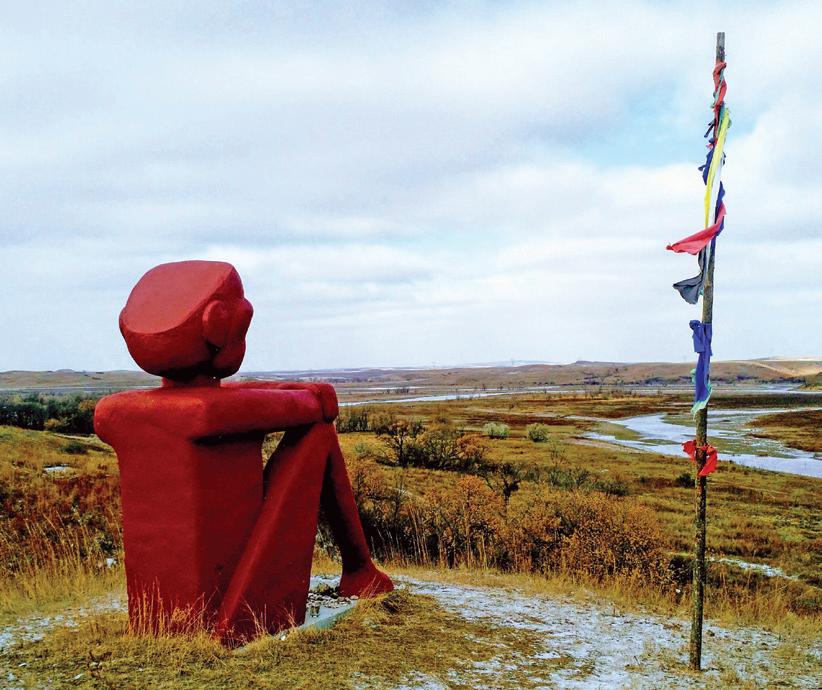
Traveler Name 1
Address / City / State / Zip Code 1
Home and/or Mobile Phone 1
E-mail Address 1 Traveler Name 2
Address / City / State / Zip Code 2
Home and/or Mobile Phone 2
E-mail Address 2
SINGLE TRAVELERS ONLY: If this is a reservation for one person, please indicate:
___ I plan to share accommodations with ________________________ OR ___ I wish to have single accommodations. OR ___ I’d like to know about possible roommates. Bed Type (not guaranteed): ___ one bed ___ two twins. I am a ___ smoker ___ nonsmoker.
We require membership in The Commonwealth Club to travel with us. Please check one of the following options:
___ I am a current member of The Commonwealth Club. ___ Please use the credit card information below to sign me up or renew my membership. ___ I will visit commonwealthclub.org/membership to sign up for a membership.
PAYMENT:
Here is my deposit of $ __________ ($1,000 per person) for ____ place(s). ____ Enclosed is my check (make payable to Distant Horizons). OR ____ Charge my deposit to my ____ Visa ____ MasterCard ____ American Express
Card Number Expires Security Code
Authorized Cardholder Signature Date
Mail completed form to: Commonwealth Club Travel, PO Box 194210, San Francisco, CA 94119-9801 or fax to (415) 597-6729. For questions or to reserve call (415) 597-6720 or email travel@commonwealthclub.org.
___ I / We have read the Terms and Conditions for this program and agree to them.
Signature
TERMS & CONDITIONS
The Commonwealth Club (CWC) has contracted with Distant Horizons (DH) to organize this tour.
Reservations: A $1,000 per person deposit, along with a completed and signed Reservation Form, will reserve a place for participants on this program. The balance of the trip is due 90 days prior to departure and must be paid by check.
Cancellation and Refund Policy: Notification of cancellation must be received in writing. At the time we receive your written cancellation, the following penalties will apply:
•61+ days prior to departure: deposit is refundable •61-30 days to departure: 50% of fare •29-1 days prior to departure: 100% fare
The tour can also be cancelled due to low enrollment. Neither CWC nor DH accepts liability for cancellation penalties related to domestic or international airline tickets purchased in conjunction with the tour.
Trip Cancellation and Interruption Insurance: We strongly advise that all travelers purchase trip cancellation and interruption insurance as coverage against a covered unforeseen emergency that may force you to cancel or leave trip while it is in progress. A brochure describing coverage will be sent to you upon receipt of your reservation. COVID-19: We understand that travelers have concerns about booking travel based on the current COVID-19 pandemic. Should U.S. health authorities deem it unsafe to travel to and from the destinations in the brochure, we will not run the trip at the scheduled time. As noted above, trip deposits are fully refundable until 60 days prior to departure.
Medical Information: Participation in this program requires that you be in good health. It is essential that persons with any medical problems and related dietary restrictions report them well before departure.
Itinerary Changes & Trip Delay: This itinerary is based on information available at the time of printing (March 2021) and is subject to change. We reserve the right to change a program’s dates, staff, itineraries, or accommodations as conditions warrant. If a trip must be delayed, or the itinerary changed, due to bad weather, road conditions, transportation delays, airline schedules, government intervention, sickness or other contingency for which CWC or DH or its agents cannot make provision, the cost of delays or changes is not included. The minimum group size of this departure is 15 paying participants, should the number of participants fall below this number, a small group surcharge and/or revised staffing will apply. suppliers of services connected with this program (“other providers”), and the other providers are solely responsible and liable for providing their respective services. CWC and DH shall not be held liable for (A) any damage to, or loss of, property or injury to, or death of, persons occasioned directly or indirectly by an act or omission of any other provider, including but not limited to any defect in any aircraft, or vehicle operated or provided by such other provider, and (B) any loss or damage due to delay, cancellation, or disruption in any manner caused by the laws, regulations, acts or failures to act, demands, orders, or interpositions of any government or any subdivision or agent thereof, or by acts of God, strikes, fire, flood, war, rebellion, terrorism, insurrection, sickness, quarantine, epidemics, theft, or any other cause(s) beyond their control. The participant waives any claim against CWC/DH for any such loss, damage, injury, or death. By registering for the trip, the participant certifies that he/she does not have any mental, physical, or other condition or disability that would create a hazard for him/herself or other participants. CWC/DH shall not be liable for any air carrier’s cancellation penalty incurred by the purchase of a nonrefundable ticket to or from the departure city. Baggage and personal effects are at all times the sole responsibility of the traveler. Reasonable changes in the itinerary may be made where deemed advisable for the comfort and well-being of the passengers. The Commonwealth Club (CST# 209688940). Distant Horizons, (CST #2046776-40)









